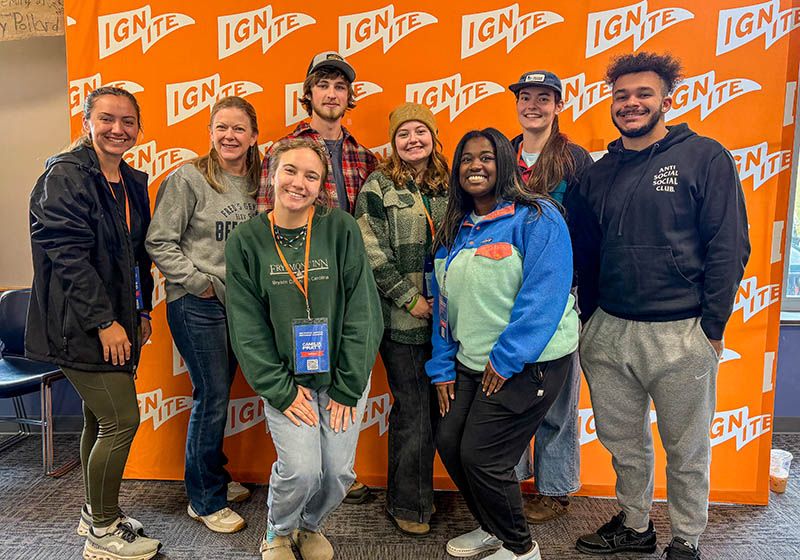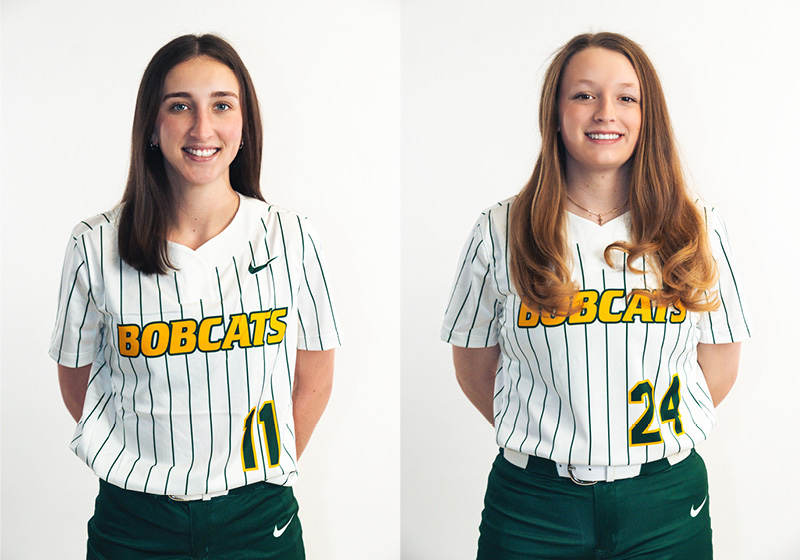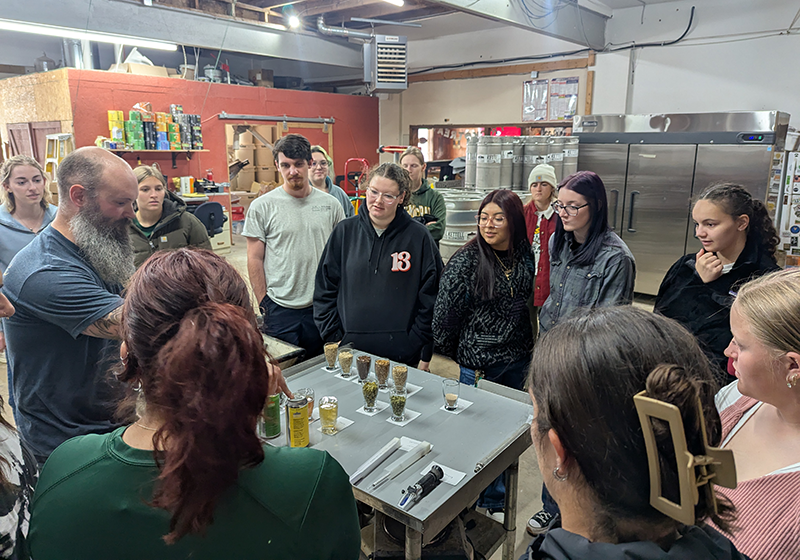
Lees-McRae students and alumni offer valuable instruction during Adaptive Ski Week at Beech Mountain Resort
For one week each January, instructors from all over the country and athletes from across the southeast come to Beech Mountain Resort to participate in the nation’s oldest adaptive snow sports clinic.
Adaptive sports can trace their beginnings to World War II. Veteran Jim Winthers had trained in alpine warfare as part of the U.S. 10th Mountain Division, and after returning home began using techniques he had learned in Europe to help injured veterans and others with mobility issues continue skiing. Winthers and other ski enthusiasts like Jim Graham and Dan McPherson began establishing adaptive ski clinics and programs throughout the country. For many injured veterans, adaptive snow sports were an important form of rehabilitation. Over time, other recreational activities were adapted to become more accessible, and now many recreation organizations and resorts have adaptive equipment and instructors trained in adaptive recreation.
Beech Mountain Resort’s Adaptive Ski Week has operated annually since 1982 and welcomes participants of all ages and ability levels. The clinic includes instruction from experts in adaptive winter sports and access to equipment that enables individuals with a range of mental or physical disabilities to ride the slopes with their preferred level of independence.
The instructors for this year’s clinic included several students currently enrolled in the Outdoor Recreation Management (ORM) PSIA-AASI Adaptive Level 1 course, which prepares students to take the Adaptive Level 1 exam and receive the certification. According to Instructor of Outdoor Recreation Management Richard Campbell, who teaches the course, certifying in adaptive ski instruction boosts the already impressive resumes of students graduating with an ORM degree by providing them with another highly sought-after skill.
For Hunter Thomas, one of the Lees-McRae students working as an instructor for the week, the adaptive sports program is also a way to help others experience the joy of skiing. The senior ORM major, who came to Lees-McRae with scholarships from the ski and snowboard team and the ORM program and who spends seven days a week on the slopes, was touched after helping a woman ski for the first time since an accident had left her paraplegic.
“She was a very proficient skier. She skied for 30+ years. Yesterday was her first time on the snow and it was a very emotional day for her,” Thomas said. “It was great to see her smile. She said she had not been that happy since the last time she had stood up and skied.”
The range of equipment available to help people ski is vast, with options like mono-skis, which are seats placed on a single wide ski, tandem skis, which allow two people to ride together, and tri-skis, which feature handlebars and sometimes a seat connected to three skis. Because the equipment is highly technical and each user has unique needs, qualified instructors who are skilled both with the equipment and working with various disabilities are invaluable.
 Hunter Thomas ’25
Hunter Thomas ’25 Jacob Vigneault ’10
Jacob Vigneault ’10Another instructor at the event was a Lees-McRae alumnus who has a career in adaptive snow sports. Jacob Vigneault ’10 is an instructor at Ogden Valley Adaptive Sports in Ogden, Utah. Vigneault hasn’t been back to the High Country since graduating, but when his employer asked if anyone from the organization would like to teach at the Beech Mountain Resort for a week, Vigneault immediately volunteered.
“It had been 14 years and the feeling was surreal,” Vigneault said. “The similarities and differences over the years made me feel really lucky to have gone to school in the area and brought back memories I had forgotten. I took away a lot of pride with Lees-McRae growing and partnering with Beech. It was a great surprise to have our orientation in a Lees-McRae classroom.”
Vigneault found his way to adaptive instruction after stepping in to help a skier with autism who was struggling during a lesson. After realizing that he had a natural talent for helping students with cognitive and physical disabilities, Vigneault accepted a job at Ogden Valley Adaptive Sports, where he “specializes in working with people with autism” and shares the joy of winter sports with as many people as possible.
Speaking of his experience at Adaptive Ski Week and how it differed from his work at Ogden Valley Adaptive Sports, Vigneault said, “At OVAS, I tend to have participants that I work with 6–8 times a year for many years. It makes the participants’ expectations/goals of the lesson a lot different. At Beech, the participants are not going as regularly, so in some cases I was letting them get some rust off and seeing where they are in their journey before trying to fully instruct. There was a reoccurring moment of having students seeing snow for the first time and having this be their only experience doing anything like this. I was really happy to be a part of being able to make it happen.”
Many students choose the ORM program not just because they love the outdoors, but because they love sharing the outdoors with others. Courses like PSIA-AASI Adaptive Level 1 Certification Prep teach students how to use their skills to assist others and make the outdoors more accessible. Outdoor recreation has many emotional and physical benefits, and adaptive sports ensure no one is denied those benefits because of disability. By adding adaptive ski instruction to their skillset and participating in events like Adaptive Ski Week, ORM students become more well-rounded practitioners and provide opportunities to others while doing what they love.


